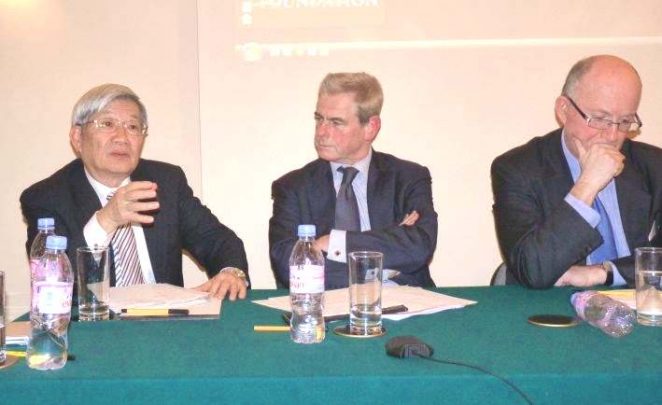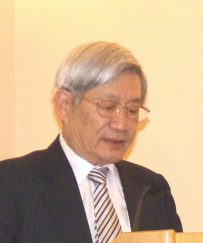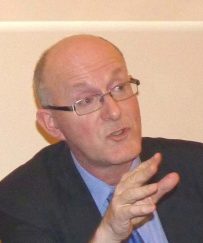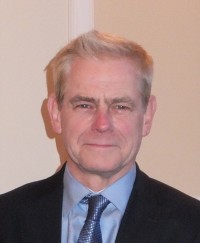 Seminar Series 2012
Seminar Series 2012Tuesday 24 January 2012
6:00pm – 7:45pm
Leadership and History in the UK and Japan
Drinks reception from 8:45pm
Daiwa Foundation Japan House
Organised by the Daiwa Anglo-Japanese Foundation
This first seminar in the 2012 series, Leadership: People and Power in the UK and Japan, drew on examples from history to set the scene for a year-long discussion of leadership issues in both countries. While lack of leadership is a recurring theme in analyses of Japanese politics, the sharing of power in Britain’s coalition government is giving rise to different concerns. The speakers reflected on past crises and successes of leadership and the importance of leadership as a force for change.
The first speaker, Makoto Iokibe, began by reflecting on past earthquakes in Japan and the theme of leadership, before turning to focus on the Great East Japan earthquake of 11 March 2011. He himself experienced the Great Hanshin (Kobe) earthquake of 17 January 1995, which struck at 5:46am with a magnitude of 7.3. It claimed the lives of 6,434 people, 90% of whom were crushed to death by collapsing houses.
At the time of the 1995 Kobe earthquake, the Liberal Democratic Party (LDP) was languishing, having lost the 1993 elections, and was trying to restore itself. The Socialist Prime Minister Tomiichi Murayama was heading a coalition with the LDP and the Harbinger Party. He nominated Ozato as the minister for reconstruction, and group leadership was successfully achieved. The Self Defense Force’s (SDF) initial response to the Kobe earthquake was slow and not very effective in rescuing survivors in contrast to the effort of police officers and firemen. New laws were subsequently passed to enable greater responsiveness from the SDF and the SDF also reformed itself from within.
Mr Atsushi Shimokobe was Chairman of the Reconstruction Committee which comprised seven people including the governor of Hyogo Prefectureand the mayor of Kobe. He made clear decisions, stipulating that the government would construct 30,000 temporary houses and would pay for the removal of debris and the clean-up operation. Decisions were made on a weekly basis and Shimokobe refrained from setting up a Reconstruction Agency in order to prevent a power struggle between agencies.
The government did squander opportunities, however, by consenting to merely returning damaged structures to their former states and requiring Kobe itself to pay for further improvements. Though it funded the restoration of the harbour to its prior 12-metre depth, it refused to pay for a deeper (16- metre) Kobe harbour, thereby denying the port city a competitive edge.
The previous major earthquake was the Great Kanto earthquake and resultant fire of 1 September 1923 which struck at 11:58am. While 90% of the fatalities (90,000) were killed by an enormous fire, largely triggered by the flames from kitchen stoves being used to prepare lunch, the remaining 10% were crushed to death.
The government of Admiral Gonnohyoe Yamamoto was in the process of being formed when the 1923 earthquake struck. Martial law was proclaimed and the Cabinet was finally formed three days later. Yamamoto’s ambitious Home Minister, Shinpei Goto, headed a Reconstruction Agency which was not totally successful. His plans for Tokyo, hoping for its restoration as a major global city, were grandiose and far from realistic. By turning the matter of reconstruction into a party political issue in favour of his government he lost the support of the opposition, which added to the difficulty of seeing his plans through. The Yamamoto Cabinet didn’t prosper, the Reconstruction Agency was abolished, and the budget that Goto had wanted to spend on reconstruction was slashed. Part of Goto’s vision was realised, nonetheless, including the building of Showa Dori, a major Tokyo avenue, and the profusion of parks built next to primary schools.
The Great East Japan earthquake of 2011, reaching a magnitude of 9.0, was one of the biggest earthquakes in history. The dead and missing, totalling over 21,000, were mostly killed by the tsunami. In addition to the damage wreaked by the earthquake and tsunami, nuclear safety concerns also ensued with the explosion at the Fukushima Daiichi nuclear power station.
Despite the devastation caused by the 11 March events, Iokibe highlighted examples of resilience. Incredibly, Kurihara City in Miyagi Prefecture, where the tremor reached its highest level of intensity, suffered no casualties; a testament to the robustness of quakeproofed houses and structures.
Furthermore, at the time the earthquake struck, ten trains were running in both directions on the Tohoku Shinkansen Line at approximately 270 kilometres per hour. None were derailed due to the efficacy of the Earthquake Quick Alarm System. Japan’s enhanced ability to deal with the threat of earthquakes through reinforcing homes and other structures, and the behaviour of its citizens when dealing with earthquakes is inspiring, commented Iokibe. Japan’s on-the-ground response capabilities are impressive; however, Iokibe suggested that a developed Western political system would, perhaps, have shown a more dynamic and coordinated response to the Tohoku earthquake, tsunami and nuclear incident.
The Great East Japan earthquake happened two years after the LDP had been voted out and replaced by the Democratic Party which was still adjusting itself to being in office. Prime MinisterKan’s Cabinet was determined to take control of the situation. It dealt positively with the 35-member Reconstruction Design Council, which was established within a month of the disaster, listening to and lending support to the experts while allowing them a certain amount of freedom. Effectively utilising government agencies proved rather more difficult.
The day after the earthquake, Kan went to the Tokyo Electric Power Company (responsible for the Fukushima Dai-Ichi nuclear plant) and instructed it to address the escalating nuclear dimension. By the end of June, the Basic Law was enacted, a reconstruction proposal made and a youthful Mr Hosono was nominated chief of the new committee. He took to his role with great aplomb. Mr Hirano, the Minister of Reconstruction, was also promoted at a younger age than usual, given the extraordinary circumstances, and also proved a successful appointment.
Kan has now been replaced by Prime Minister Noda, from whom Iokibe expects good results. He has passed a new budget and will be well-regarded if he is able to deal with the government’s 200% debt. Making towns safer and more secure and assessing the question of halting or continuing with nuclear power generation are problems that need to be discussed.
Referring to the support shown to Japan from countries around the world, Iokibe suggested that Japan is well-placed to reciprocate. Japan, a developed nation with a history replete with natural disasters, should take the lead in the area of disaster prevention and reduction through the know-how and technology it has garnered through its own experiences. The Great East Japan earthquake has the potential of acting as a catalyst for reinvigorating Japan as a whole and, Iokibe affirmed, Japan can only survive by being an integral part of the international community.
The second speaker, Professor Jeremy Black MBE, began by saying that there are two essential ways of approaching the theme of leadership. Its inherent characteristics or qualities, which exist across time, can be looked at, or it can be viewed from a historical approach which argues that leadership is specific to particular periods and context. The latter is Black’s own approach, as he believes in ‘the revenge of the specific on the general’. This isn’t to say, however, that there aren’t other ways of looking at notions of leadership.
The nature of leadership is very dynamic. Over the last 150 years the world has changed rapidly, making the idea of an inherent type of leadership doubtful. Fundamental changes in domestic politics and the international order, as well as the acceptability of a readier resort to violence, reflect our volatile and precarious circumstances. Moreover, given our longer lifespans, an individual’s values may change over time. A leader would have to judge best how to lead while adjusting to these paradigms.
In 1950, Britain took part in a conflict in a country little-known to the population at the time. It ended up sending the second largest international contingent to Korea. In that more deferential, disciplined society, this was largely accepted and conscription was seen as normative. By 1982 and the Falklands War, the British war cabinet was quick to say that it would tolerate a maximum of 1,000 deaths before accepting negotiations. This represented a change in attitudes happening within a lifetime said Black. At present, and as a result of changing paradigms, society is less willing to accept this number of deaths.
What would an ‘effective’ leader have meant inJapanand the UK in the 1920s and 1930s, posited Black. Who was offering more leadership in 1936, 1937 and 1938 over appeasement? Was it leadership to engage in war or to reassess what could be done or for Chiefs of Staff to resist fighting as a result of overstretched resources which was inherently true of the situation?
Black went on to look at leadership in societal, military and political contexts. Looking at the top end of society, there are two ways of running a monarchical system said Black: either as a hereditary or meritocratic monarch. It may seem very easy to argue that leadership is clear-cut, but to a historian, looking at most issues, this is very rarely the case.
It can be argued that a hereditary monarch tends to be lacking in leadership, having done nothing to gain power. In a meritocracy, on the other hand, the leader attains power due to his/her own efforts. He or she could be vicious, unpleasant or not clear-cut. It is often much harder to legitimate the gaining of power in a meritocratic system. It is difficult to say which system is better as this will depend on context.
The assumption that there is an inherent quality called leadership results in believing that leadership pertains to a particular group or class of society or an entire people, remarked Black. Classic nineteenth-century thought in leadership claimed it pertained at the level of the nation or race. Western racial thought became dominant from the 1850s and racists believed that if they weren’t leading, they weren’t fulfilling their function. Though this sounds abhorrent to us, in the nineteenth-century leadership was seen in terms of vitalism, in a way that today it is seen much more in terms of functionality. The sense that there should be some value of analysis across time is quite problematic, therefore.
The notion of inevitability in history is deeply suspect and one cannot argue that resources, per se, or historical figures can affect outcomes in a determinist way. If you appropriate a Marxist or determinist approach to history, these views may downplay the role of leadership. The idea that states and political movements can only succeed where they have the support of people and resources or that wars are won by those with the largest industrial capacity is erroneous.
Black went on to say that he is deeply troubled by the anti-politics discourse in some countries, which blames politics and politicians for the state of affairs. By and large, political actions often reflect the constitution and political culture of a country and to blame politicians for lack of leadership inherently suggests a degree of alienation from the process of accepting compromises and governance. This may not be acceptable in a crisis, one may think, or one may argue for a sea-change but this will lead to totalitarian states. Hugo Chavez is only too happy to extol his virtues as leader and shows exactly what is wrong with attacking politics.
Whoever appears now as a clear-cut leader will be shown, in 30 years’ time, to have doubts and hesitations. We shouldn’t assume that change won’t continue. In modern political systems, which have a relatively high number of politically-engaged people, all leaders will be controversial to some extent and the idea that the military or industry are purer forms of politics may be advanced. It is naïve to rise above context and culture and one should accept that the political virtues are often those which do not lead themselves to crude ideas of leadership.
The questions and answers following the talks were varied and covered themes such as the importance of taking into consideration the nature of institutions and how they relate to one another (e.g., parliament and the cabinet), the role of the mass media, whether compassion is an important aspect of leadership and the fact that the public’s expectations of leaders in domestic affairs are different from their expectations regarding their role in foreign affairs.
The chair, William Horsley, concluded by thanking the speakers for their detailed contributions and rounded up the seminar by saying that leadership is crucial and must be weighted within a dynamic context of the age and different appreciations of what leadership is. It is a concept that cannot be simplified.
This event was supported by Japan Airlines.
About the contributors

Professor Makoto Iokibe
Professor Makoto Iokibe is President of the National Defense Academy. Graduating with an MA from Kyoto University, he taught at Hiroshima University from 1969-1981, and was then Professor of diplomatic history at Kobe University from 1981-2006. He was a Visiting Fellow at Harvard University from 1977-1979, and 2002-2003, and at the London School of Economics and Political Sciences (LSE) from 1990-1991. He was appointed to his current position in August 2006 and has also been chairing the Reconstruction Design Council of the Great East Japan Earthquake since April 2011.

Professor Jeremy Black
Professor Jeremy Black MBE is Professor of History at the University of Exeter. Graduating from Cambridge with a starred first, he did postgraduate work at Oxford, and then taught at Durham, before moving to Exeter in 1996. He has lectured extensively in Australia, Canada, Denmark, France, Germany, Italy, New Zealand, and the USA. A past Council member of the Royal Historical Society, Black is a Senior Fellow of the Foreign Policy Research Institute. He was appointed to the Order of Membership of the British Empire for services to stamp design. He is or has been on a number of editorial boards including the Journal of Military History, the journal of the Royal United Services Institute, Media History, the International History Review, and History Today and was editor of Archives. He is the author of over 100 books, especially on eighteenth century British politics and international relations.

William Horsley (Chair)
William Horsley is a journalist and writer on international affairs, and Chairman of the Association of European Journalists in the UK. He took a degree in Japanese Studies at Oxford University in 1971 and was BBC Bureau Chief in Tokyo from 1983 to 1990, covering Japan, China and other parts of Asia for BBC TV and Radio. Since then, based in Germany and the UK, he has reported extensively on the re-shaping of Europe’s political landscape after the end of the Cold War and major developments in world diplomacy. He left BBC News in 2007 to continue writing and broadcasting independently, and is now also international director of the Centre for Freedom of the Media attached to the University of Sheffield. He is the co-author with Roger Buckley of [i]Nippon: New Superpower [/i](BBC Books, 1990).
